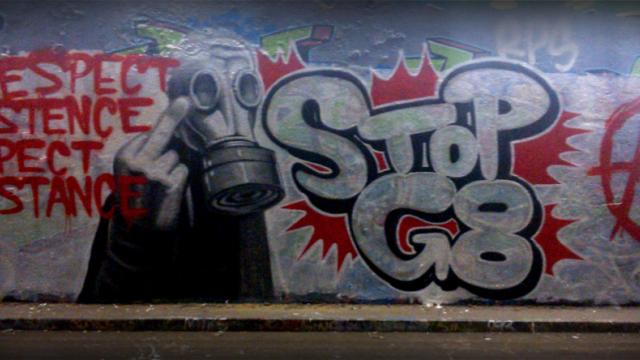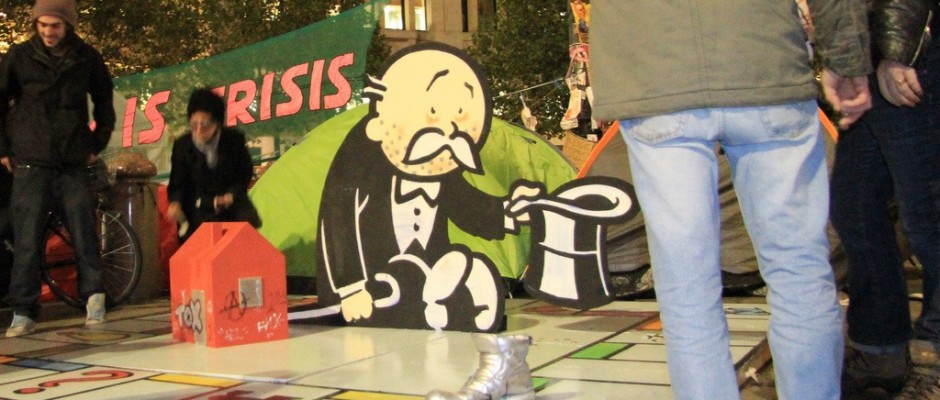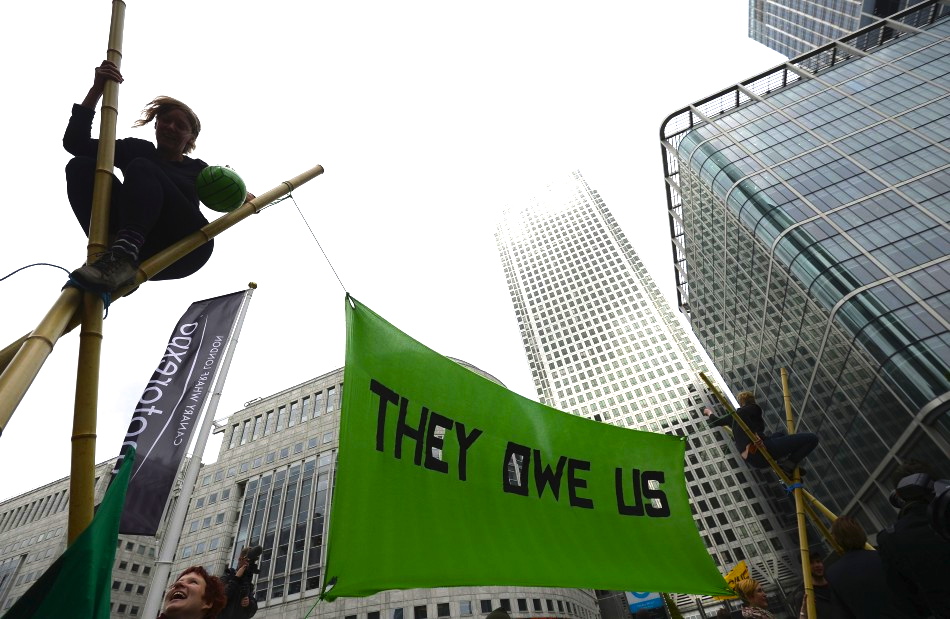
Last Friday, June 14, They Owe Us saw hundreds converge on Canary Wharf in London. Between corporate towers and in front of a large banner reading "CAPITALISM = CRISIS," a broad coalition of groups reclaimed the space to host public discussions, workshops, music and political performances. Until now, legal injunctions have prohibited mass public actions from targeting Canary Wharf, and the scene formed part of a backdrop of week-long actions against the G8 Summit being held Northern Ireland.
“These guys [banks and corporations] are providing nothing for us anymore," said anthropologist David Graeber, author of Debt: The First 5,000 Years, as he addressed the crowd. "They’ve given up on the idea that capitalism can provide an increasing standard of living for everyone.”
He explained how the financial-political system justifies the excesses of the elites, by asserting that “A: nothing else is possible, and B: you have to pay your debts. And these guys don’t even pay their debts,” he said. Pointing at the towers, Graeber urged people to engage in mass civil disobedience against capitalism, including carrying out debt strikes.
Debt was one theme linking the broad coalition that coordinated last week's event. Occupy London activists combined with others focused on climate justice, human rights and opposing austerity. Input also came from UK Uncut, whose direct actions have been crucial in drawing Britain's public focus to corporate tax evasion.
A theme running through the discussions was how the UK bank bailouts and companies’ extensive use of tax evasion amounted to corporate welfare. Many banks and corporations, with headquarters at Canary Wharf, are at the heart of the current crisis in which the increase in national debt from corporate welfare is being used to justify austerity, and it in turn is destroying social welfare.
Speakers at the action represented groups ranging from Disabled People Against Cuts to Fuel Poverty Action and London Pensioners’ Association – all of whom spoke of vital supports that are being removed, leading to more poverty and in some cases deaths. “It’s eat or heat,” one women said, explaining the consequences of rising fuel and food prices.
The day also focused on how banks – particularly those same institutions bailed out with public money – finance ecologically devastating projects like fracking and tar sands extraction. Barclays and Citibank both have their headquarters in Canary Wharf, and both are financing tar sands. Citibank also received one of the largest bailouts from the Federal Reserve. Held just prior to the G8, the Canary Wharf action put an emphasis on climate change, which wasn't even on the agenda at the official meeting in Northern Ireland. The tight links between Big Oil and the global banks have also been sharply defined by a recent Carbon Tracker report, which showed that banks last year invested over £441 billion in fossil fuel extraction.
Canary Wharf is itself a symbol of global inequalities. The borough of Tower Hamlets – which surrounds this exclusively priced area of retail, commerce and banking – is one of the most deprived areas in Britain. A study from earlier this year reported over 40% of children in the region live below the poverty line.
If "There is no alternative" is the singular motto being pushed by those thriving under the current financial-political model, "They Owe Us" presented a different vision altogether: a wide coalition offering complementary alternatives through a participatory democratic structure. At the start of the action, two bamboo tripods were raised to mark the space, and between them hung a banner that read “shift the debt.”
Passersby were welcomed to join, learn and discuss. Many came on their lunch break or after the work day. One man dressed in a suit talked and listened with others, and just before returning to work, assessed what he had observed: “So basically you guys just want the world to stop being run by big banks and give the power back to the people.”
3 WAYS TO SHOW YOUR SUPPORT
- Log in to post comments


















